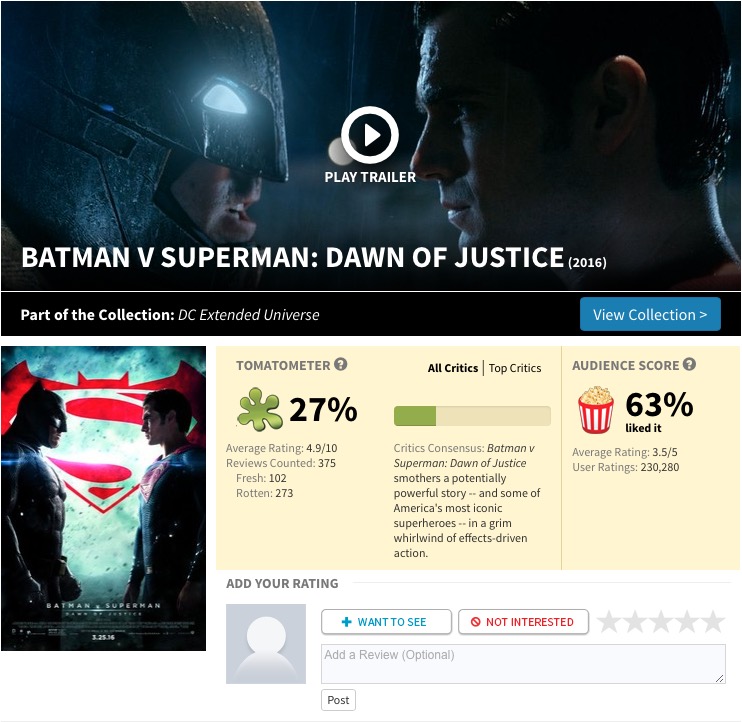Whether you are a diehard or casual movie fan, it’s not hard to find threads upon threads of Facebook comments from people complaining about a little site called Rotten Tomatoes. Whether it is people complaining that Rotten Tomatoes hate DC or that Disney pays them to love every movie under their umbrella, it’s clear that there is still a large section of movie fans that don’t understand how Rotten Tomatoes works. For those that don’t, this guide should help explain exactly how it works. For those that do, fee free to use this to combat the internet trolls.
Does Rotten Tomatoes give a mark to films?
In simple terms, no. The percentage you see given to a film is not a mark out of 100, but rather a representation of how many critics positively reviewed the film. For example, Rotten Tomatoes did not give Batman v Superman a 27/100 instead, of the 375 critics that reviewed the film, only 27% of them reviewed it positively.

Are critic’s scores the only ones that count in a Rotten Tomatoes score?
Rotten Tomatoes has two separate scores for each film, the Tomatometer and the Audience Score. The Tomatometer is the score based purely on positive critical reviews of the film. However, not every critic is included. To become a certified Rotten Tomatoes’ critic, the reviewer must fit the Tomatometer criteria and apply on the site. This means that any old Joe Blow can’t have his say in the Tomatometer.
The Audience Score is a bit more self explanatory. This is where the Joe Blows of the world can have their opinion heard. There are of course flaws in this score, similar to that collected by IMDb, in that there is no guarantee that voters have actually seen the film. This often results in the Audience Score being more heavily skewed in either a positive or negative direction.
What counts as a positive review?
The definition of a positive review changes depending on if the review is a part of the Tomatometer or the Audience Score. For a Tomatometer review to be positive, the review score must be a 6/10 or higher, meaning scores of 5.9/10 or lower are counted as a negative review.
The benchmark of what a positive review is for the Audience Score is slightly higher. For an Audience Score review to be positive, the review score must be 7/10 or higher, meaning those of 6.9/10 or lower are counted as a negative review. It’s unclear why the Audience Score must be higher to be considered as a positive review.
What is Fresh and Rotten?
Rotten Tomatoes works on a binary system. Based on the percentage of positive and negative reviews, each film is given a Fresh or Rotten rating. For a film to achieve a Fresh rating, at least 60% of it’s reviews must be positive. Anything under that will result in a Rotten rating. This standard applies to both the Tomatometer and the Audience Score.
There is however a third rating, Certified Fresh. For a film to receive this rating, it must have a Tomatometer of 75%
or higher for a certain period of time. It must also have a minimum of 80 critic reviews, including five Top Critics for wide release films; and 40 critic reviews, including five Top Critics, if it is in limited release.
Is there another site that is better than Rotten Tomatoes?
Rotten Tomatoes is the leading site when it comes to viewing critics’ scores. It highlights the overall critical consensus and common thoughts had about the film. For those who want to know a bit more than a simple positive or negative rating of film, Rotten Tomatoes also gives you an average rating for all of the Tomatometer scores.

When it comes to the audiences evaluation of the film, Rotten Tomatoes suffers the same problem as IMDb where anyone can vote without proof that they have seen the film. By far, the best source for audience thoughts is Cinemascore. Cinemascore polls the viewing audience as they leave the cinemas during opening weekend in North America. This means that outside influences (internet trolls) can not influence the score from the comfort of their own home (or dungeon).
It is important to remember that film and art as a whole are subjective. Just because you have a different appreciation of something that many people did or did not, does not make your opinion invalid. Scores from Rotten Tomatoes, IMDb and Cinemascore are not fact. Don’t use them to tell other people they are wrong. As fans of film, have discussions about film, talk about what you liked, talked about what you didn’t like, listen to other people’s opinions. We already have enough things in this world tearing us apart, don’t let films and internet trolls be one of them.

